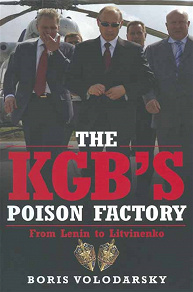E-bok
The KGB's Poison Factory
In late November 2006 the world was shaken by the ruthless assassination in London of Alexander Litvinenko, a former Lt Col of the Russian security service (FSB). The murder was the most notorious crime committed by the Russian intelligence on foreign soil in over three decades. The author, Boris Volodarsky, who was consulted by the Metropolitan Police during the investigation and remains in close contact with Litvinenko’s widow, is a former Russian military intelligence officer and an international expert in special operations. His narrative reveals that since 1917 – beginning with Lenin and his Cheka – the Russian security services have regularly carried out bespoke poisoning operations all over the world to eliminate the enemies of the Kremlin. The author proves that the Litvinenko’s poisoning is just one episode in the chain of murders that continues until the present day. Some of these assassinations or attempted assassinations are already known, others are revealed here for the first time.
Uniquely Volodarsky has had a personal involvement in almost every each of the 20 cases, from the radioactive thallium poisoning of the Soviet defector Nikolai Khokhlov in Frankfurt in September 1957 to the ricin ‘umbrella murder’ of the Bulgarian dissident Georgi Markov in London in 1978. "Here, for the fan of murder thrillers and modern history alike, is a cracking good read. In brilliant light we see what lay for nearly a century behind the London polonium poisoning of British citizen Alexander Litvinenko, former Russian. It was just one recent hit by the world's most prolific serial killer -- the Russian state. With original research guided by his insider's eye and scholarly care, Boris Volodarsky recounts scores of murders. Assassination emerges as state policy, as institutionalized bureacracy, as day-to-day routine, as laboratory science, as a branch of medicine researching ways not to stave off death but to deliver it in apparently innocent or accidental forms, and as engineering technology, devising ever-new devices to meet each new requirement, from umbrella tips and cigarette cases and rolled-up newspapers -- to Litvinenko's teacup." Tennent H. Bagley, former CIA chief of Soviet Bloc counterintelligence.
Uniquely Volodarsky has had a personal involvement in almost every each of the 20 cases, from the radioactive thallium poisoning of the Soviet defector Nikolai Khokhlov in Frankfurt in September 1957 to the ricin ‘umbrella murder’ of the Bulgarian dissident Georgi Markov in London in 1978. "Here, for the fan of murder thrillers and modern history alike, is a cracking good read. In brilliant light we see what lay for nearly a century behind the London polonium poisoning of British citizen Alexander Litvinenko, former Russian. It was just one recent hit by the world's most prolific serial killer -- the Russian state. With original research guided by his insider's eye and scholarly care, Boris Volodarsky recounts scores of murders. Assassination emerges as state policy, as institutionalized bureacracy, as day-to-day routine, as laboratory science, as a branch of medicine researching ways not to stave off death but to deliver it in apparently innocent or accidental forms, and as engineering technology, devising ever-new devices to meet each new requirement, from umbrella tips and cigarette cases and rolled-up newspapers -- to Litvinenko's teacup." Tennent H. Bagley, former CIA chief of Soviet Bloc counterintelligence.
Logga in för att låna
Information
Stöds av följande plattformar
PC/Mac
Surfplatta Läsplatta
Smartphone

